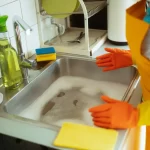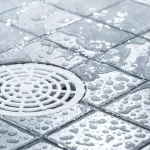Floods are never good news for a homeowner. At best, they are a messy situation that can take hours to clean up, and more hours to dry out. At worst, they can completely destroy personal property, cause mold and mildew, and wreck the structure’s foundations. We have posted previously on methods to deal with basement flooding, such as drains and pumps, or applying waterproof coatings. Today we will discuss a more advanced method: one that alerts you as soon as flooding becomes a problem.
What is a Backwater Valve Flood Alarm?
A flood alarm is a system that utilizes sensor arms to monitor water flow and pressure. These pieces of technology can be used to detect leaks, floods, or other urgent problems within a plumbing system. By installing a backwater valve flood alarm system, you can actually protect your home from sewer floods.
One great example of these devices is the Flood Alarm by Rialco. This doesn’t only have to be installed in a valve. The alarm itself can attach to multiple sensor arms, with each one having a range of up to 50 feet. This means that a single alarm can cover most of your plumbing system and alert you to low water pressure due to leaks, or other problems.
A common usage of Flood Alarms is to detect floods due to human behavior, such as a bathtub that is left with the water running. Eventually the water will overflow out of the bathtub, and keep running. A flood alarm will detect that there is a flood occurring, and can be configured with an automatic shut-off device to cut the water supply, ending the flood. It can also be configured to alert the proper individuals, such as the building manager, and the plumbing contractor.
When Should You Install a Backwater Valve Alarm?
Sewer back-ups can happen during very stormy weather. When the city’s drain lines become overworked, they can no longer take more waste. If this happens, the backed-up city lines can actually flow back through your drain. The end result is that you get sewage in your basement, which is hardly an ideal place for it. To prevent this from happening, backwater valves are installed.
While backwater valves can help prevent sewage backflow, they don’t always work to completely prevent your basement from flooding. While the valves generally do not fail themselves what can happen is that when the valve is activated it blocks the flow of water to the sewer, essentially sealing the property off. What can happen is that people don’t realize their backwater valve has been activated and they continue to go use their appliances and fixtures. With no where to go all of this water can eventually back-up and cause flooding within their home. Installing a flood alarm can be a very simple way to let people know if the water they’re using in their home is actually running down the drain or not.
While backwater valves prevent sewage overflow, they can fail if not properly maintained. A flood alarm can also help in this situation. Extreme rainfall (like that which overwhelms the city drains) can also cause the valve to fail. When this happens, water may start to flow back into the basement. As soon as this happens, the flood alarm can alert you.
While a flood alarm is a great idea for any building that is connected to city drain lines, it should not be used to replace more traditional waterproofing methods such as sump pumps or weeping tiles. Rather, it should be used to augment any existing efforts at controlling flooded basements.
What Are Some Potential Downfalls?
Flood alarms share a main downfall with another flood management device: sump pumps. Like a sump pump, a flood alarm is dependent on electricity, and cannot function without it. The same stormy situations that can cause infrastructure failure often also cause power failures. So, like a sump pump, it is always recommended that you install a back-up power supply for your flood alarms. In some situations, the same back-up supply can be used to power the flood alarm as the sump pump, as well as other emergency devices. A bank of good batteries and a gasoline generator is always good to have around in these situations.
There is one last option: severing your main drain from the city drain lines. While this will ensure that the city sewage cannot back-up into your home, at the same time you will need to find an alternative method of draining your sewage. If this alternative is not up to par, or becomes clogged, the same problems can apply.
A backwater valve flood alarm can be a very effective device to help you combat flooding problems in your home and it is advisable for anyone that is looking to further prevent water damage to have one installed in their home.






